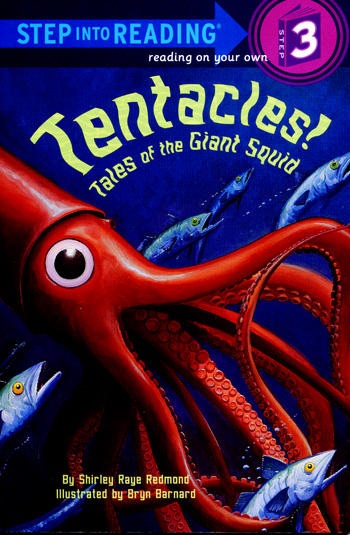The foreshadowing last week was accurate. This week, we offer a review of Tentacles! Tales of the Giant Squid by Shirley Raye Redmond with illustrations by Bryn Barnard.

Younger offspring: We should talk about my new squid book for the Friday Sprog Blog.
Dr. Free-Ride: OK. What do you like about this book?
Younger offspring: (Gazing at the cover) I like the cute face of the giant squid.
Dr. Free-Ride: You think that’s a cute face, huh?
Younger offspring: Yeah. I like it when it only has one eye on each side* and it’s giant and round.
Dr. Free-Ride: It’s kind of roundish. So tell me what kind of book this is.
Younger offspring: It’s not a made up story book. It has facts.
Dr. Free-Ride: So what does this book tell you about giant squids that you didn’t know already?
Younger offspring: It tells me that … (opening the books and finding a page) “In 2002, another dead squid washed up on a beach in Australia.” I didn’t know that, because I was only a year old in 2002.
Dr. Free-Ride: You weren’t a big newshound at that point. So why is the squid washing up on the beach a fact that sticks with you?
Younger offspring: They show school children looking at the dead squid. Also, the book says scientists can learn lots of things by examining the dead squids.
Dr. Free-Ride: I guess dead giant squids might be easier to examine than live giant squids.
Younger offspring: I bet live giant squids are good at hiding, even though they’re giant.
Dr. Free-Ride: Let’s say another child saw this book as a library book and was thinking about whether to get it. What would you tell them about this book to help them decide?
Younger offspring: It has stories people told about giant squids attacking ships or fighting with whales.
Dr. Free-Ride: Those are kind of exciting.
Younger offspring: But it also tells about what scientists know about giant squids. Some of the stories the sailors told probably can’t be true because giant squids stay deep in the ocean unless they’re sick.
Dr. Free-Ride: Ah, so you have the legends and the reality.
Younger offspring: Yeah. And the giant squid is not a myth, even though some people used to think it was.
Dr. Free-Ride: Mmm hmm. The dead squids washing up on beaches or getting caught in fishing nets do a pretty good job of proving their own existence.
Younger offspring: There’s a picture of a squid that isn’t giant swimming in a cereal bowl. It’s really cute.
Dr. Free-Ride: Yeah, well you also said the giant squid on the cover is cute. I guess size isn’t a necessary component of cute for you.
Younger offspring: And the book says they have bodies shaped like tubes, and their beaks are like parrots’ beaks.
Dr. Free-Ride: Hey, that picture shows a giant squid using its beak to snap a wooden oar.
Younger offspring: But they don’t eat oars, they eat fish. They use the suction cups on their tentacles to hold the fish. And there are little teeth around the suction cups.
Dr. Free-Ride: I didn’t know that.
Younger offspring: I didn’t know that sperm whales like to eat giant squids. I think this squid is going to die. See, its eye is closing.
Dr. Free-Ride: Hmm, so you think in the book the closing eye foreshadows the squid’s death?
Younger offspring: I think so.
Dr. Free-Ride: Maybe it’s just the artist’s representation that the squid somehow senses it’s in danger.
Younger offspring: Also, I didn’t know that the squid is a mollusk.
Dr. Free-Ride: I thought you already knew that.
Younger offspring: No, I didn’t. I sounded it out myself.
Dr. Free-Ride: Was this a hard book to read, or was it OK for the end of first grade?
Younger offspring: It was OK.
Dr. Free-Ride: Any new words you learned by reading this book?
Younger offspring: “Mollusk” and “myth”. I think I already knew all the others.
Dr. Free-Ride: Do you think other kids would like this book?
Younger offspring: Yes!
_______
*I take it this was admiration for the artist’s use of perspective in rendering the picture of the squid. Younger offspring has a thing for geometrical perspective.
Related content: Friday Sprog Blogging: can kids handle science parody?

Want!
I love this series! I just got turned on to your sprog-blogging in the last few weeks, and as a dad and a writer (of sorts) I dig the hell out of it!
Thank heavens. I was just about to stick it to Dr. Free-Ride in a comment on yesterday’s dialog that Friday IS a work day.
I’ll give you the time differential, but after that I get antsy.
I prefer to analyze dead squid grilled over white beans with a parsley sauce like they serve at Delfina.
*(heart)s Younger Offspring*
That was an excellent book review! I haven’t read this particular booke, but my son and I (he’s nine now) have read several others in that series over the years. They tend to be good books for young readers.
Also, I agree that the giant squid is cute. (I also agree that size is not always a factor in cuteness. I think adult and baby alligators are both cute, for example. Then again, maybe that example just shows that my idea of “cute” is somewhat skewed). 😀
We’re on our way to the library after I pick up my son from school. Maybe we’ll see if they have “Tentacles!” I bet my son would enjoy it.
I just love Younger Offspring. I hope I was as interested (and as interesting) a kid.